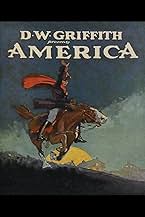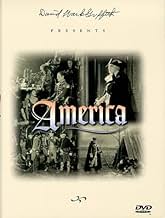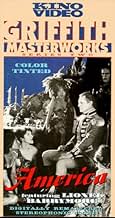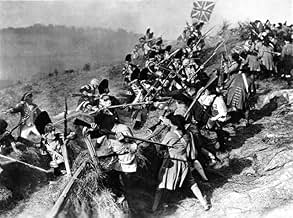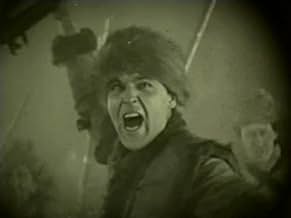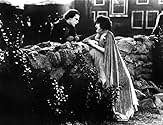Ajouter une intrigue dans votre langueThe story of a family caught up in the American Revolutionary War.The story of a family caught up in the American Revolutionary War.The story of a family caught up in the American Revolutionary War.
- Récompenses
- 1 victoire au total
Lucille La Verne
- A Refugee Mother
- (as Lucile La Verne)
Paul Doucet
- Marquis de Lafayette
- (as H. Paul Doucet)
Histoire
Le saviez-vous
- AnecdotesThis film is regarded as a major turning point in the career of D.W. Griffith. Its critical and public failure ended Griffith's tenure as the industry's preeminent director.
- GaffesPaul Revere falls off his horse. For some reason, Griffith has Revere ride up the steps of people's homes to announce "The British are coming!" as if he has to shout this at their doors. Backing down one set of stairs, Revere's horse falls, tossing the actor, who quickly recovers and shows considerable concern for the horse's welfare. Griffith left in the spill.
- Citations
Nathan Holden: Love may come and love may go, and sigh like the wind from tree to tree. But I shall love no more, no more, till this fair maid come back to me.
- ConnexionsEdited into The Negro Soldier (1944)
Commentaire à la une
I waited until the 4th of July to write this because . . . well . . . because it just feels right to be doing it on this day.
In 1924 D.W. Griffith needed a hit, he had not had a big one since ORPHANS OF THE STORM (1921). He'd been working steadily since then but his movies had been smaller in scope and had failed to hit the right chord with audiences. He was planning a film about Patrick Henry when he was contacted by members of the Daughters of the American Revolution (DAR) who asked if he might expand his ideas to encompass more of the American Revolution. This movie is the result. By the time he had finished he had a 14 reel history lesson and there wasn't a trace of Patrick Henry anywhere.
We all know the story of the Revolutionary War but Griffith threw in a love story with Patriot farmer Nathan (Neil Hamilton) falling in love with Tory aristocrat Nancy Montague (Carol Dempster, a leading lady for Griffith for many years). Complicating matters is the fact that Nancy's father hates Nathan . . . well not just Nathan, he hates all rebels. It does not help matters when, during a skirmish on the streets of Lexington someone jostles Nathan's arm causing him to discharge his gun and accidentally wound Nancy's dad!
Paralelling the love story is the (mostly true but partially embellished) story of Capt. Walter Butler (Lionel Barrymore) a renegade British officer who feels he owes allegiance to no one. With Thousands of Indians form the Six Nations on his side he hopes to crush the colonials and become monarch of his own empire.
Comparisons with BIRTH OF A NATION (1915) are inevitable. The Montague family might just as well be the Cameron's from the earlier film while Nathan could be a part of the Stoneman family. The sequence of the Battle of Bunker Hill is staged very similarly to a scene in BIRTH OF A NATION with the attacking army, in this case the Redcoats, storming a trench packed with Patriots. The only thing missing is Henry Walthall charging across No Man's Land to stuff a flag into the muzzle of a cannon. Amazingly enough the battle scenes in America seem to lack the energy of the battle scenes in BIRTH and fail to draw the audience in. Something is clearly missing. It isn't scope, G.W. "Billy" Bitzer's camera work is quite good. Maybe what is missing is . . . dare I say it . . . sincerity?
The brutality of Capt. Butler and his men is well underscored although much of it happens in long shot or offscreen. Don't expect any heads to be lopped off in closeup like we saw in INTOLERANCE (1916). In one scene Butler's second in command, Capt. Hare (Louis Wolhiem) gouges out the eyes of a captive colonist. We see only the beginning of the deed, for the remainder the camera focuses on Hare's face as he obviously has a good time doing this. Lionel had been working with Griffith on and off since 1912. A story goes that he approached Griffith for work and D.W., knowing the reputation of his famous family, said "I am not hiring stage actors." to which Lionel replied "And I am nothing of the kind, sir!" He makes a very good and quite believable villain. Louis Wolhiem appeared with Lionel's older brother John three times; in SHERLOCK HOLMES and DR. JEKYLL AND MR. HYDE (both 1920) and later in THE TEMPEST (1927). As Capt. Hare his wild staring eyes and disheveled hair not only mark him as a villain but make you think he is quite mad also.
Neil Hamilton later remarked that America was his first time on horseback and "I was scared to death.". He hides his displeasure very well though and we can believe he was quite the equestrian by the time shooting was over. Mr. Griffith was very much in love with Carol Dempster and at one point asked her to marry him. She refused and soon left his stock company, after which her star status gradually waned.
Speaking of horses, one accidentally amusing moment which had to be unscripted came during the depiction of Paul Revere's ride. He rides his horse right up on the front porch of a family to announce "To arms! The Regulars are coming!" but as he tries to leave the horse cannot negotiate the steps backwards and stumbles spilling his rider on the ground! I am amazed Griffith did not do another take.
So is America a classic? YES! Don't wait for July 4th to see it, it is enjoyable anytime.
In 1924 D.W. Griffith needed a hit, he had not had a big one since ORPHANS OF THE STORM (1921). He'd been working steadily since then but his movies had been smaller in scope and had failed to hit the right chord with audiences. He was planning a film about Patrick Henry when he was contacted by members of the Daughters of the American Revolution (DAR) who asked if he might expand his ideas to encompass more of the American Revolution. This movie is the result. By the time he had finished he had a 14 reel history lesson and there wasn't a trace of Patrick Henry anywhere.
We all know the story of the Revolutionary War but Griffith threw in a love story with Patriot farmer Nathan (Neil Hamilton) falling in love with Tory aristocrat Nancy Montague (Carol Dempster, a leading lady for Griffith for many years). Complicating matters is the fact that Nancy's father hates Nathan . . . well not just Nathan, he hates all rebels. It does not help matters when, during a skirmish on the streets of Lexington someone jostles Nathan's arm causing him to discharge his gun and accidentally wound Nancy's dad!
Paralelling the love story is the (mostly true but partially embellished) story of Capt. Walter Butler (Lionel Barrymore) a renegade British officer who feels he owes allegiance to no one. With Thousands of Indians form the Six Nations on his side he hopes to crush the colonials and become monarch of his own empire.
Comparisons with BIRTH OF A NATION (1915) are inevitable. The Montague family might just as well be the Cameron's from the earlier film while Nathan could be a part of the Stoneman family. The sequence of the Battle of Bunker Hill is staged very similarly to a scene in BIRTH OF A NATION with the attacking army, in this case the Redcoats, storming a trench packed with Patriots. The only thing missing is Henry Walthall charging across No Man's Land to stuff a flag into the muzzle of a cannon. Amazingly enough the battle scenes in America seem to lack the energy of the battle scenes in BIRTH and fail to draw the audience in. Something is clearly missing. It isn't scope, G.W. "Billy" Bitzer's camera work is quite good. Maybe what is missing is . . . dare I say it . . . sincerity?
The brutality of Capt. Butler and his men is well underscored although much of it happens in long shot or offscreen. Don't expect any heads to be lopped off in closeup like we saw in INTOLERANCE (1916). In one scene Butler's second in command, Capt. Hare (Louis Wolhiem) gouges out the eyes of a captive colonist. We see only the beginning of the deed, for the remainder the camera focuses on Hare's face as he obviously has a good time doing this. Lionel had been working with Griffith on and off since 1912. A story goes that he approached Griffith for work and D.W., knowing the reputation of his famous family, said "I am not hiring stage actors." to which Lionel replied "And I am nothing of the kind, sir!" He makes a very good and quite believable villain. Louis Wolhiem appeared with Lionel's older brother John three times; in SHERLOCK HOLMES and DR. JEKYLL AND MR. HYDE (both 1920) and later in THE TEMPEST (1927). As Capt. Hare his wild staring eyes and disheveled hair not only mark him as a villain but make you think he is quite mad also.
Neil Hamilton later remarked that America was his first time on horseback and "I was scared to death.". He hides his displeasure very well though and we can believe he was quite the equestrian by the time shooting was over. Mr. Griffith was very much in love with Carol Dempster and at one point asked her to marry him. She refused and soon left his stock company, after which her star status gradually waned.
Speaking of horses, one accidentally amusing moment which had to be unscripted came during the depiction of Paul Revere's ride. He rides his horse right up on the front porch of a family to announce "To arms! The Regulars are coming!" but as he tries to leave the horse cannot negotiate the steps backwards and stumbles spilling his rider on the ground! I am amazed Griffith did not do another take.
So is America a classic? YES! Don't wait for July 4th to see it, it is enjoyable anytime.
- reptilicus
- 3 juil. 2006
- Permalien
Meilleurs choix
Connectez-vous pour évaluer et suivre la liste de favoris afin de recevoir des recommandations personnalisées
Détails
- Durée2 heures 21 minutes
- Mixage
- Rapport de forme
- 1.33 : 1
Contribuer à cette page
Suggérer une modification ou ajouter du contenu manquant

Lacune principale
By what name was Pour l'indépendance (1924) officially released in Canada in English?
Répondre
